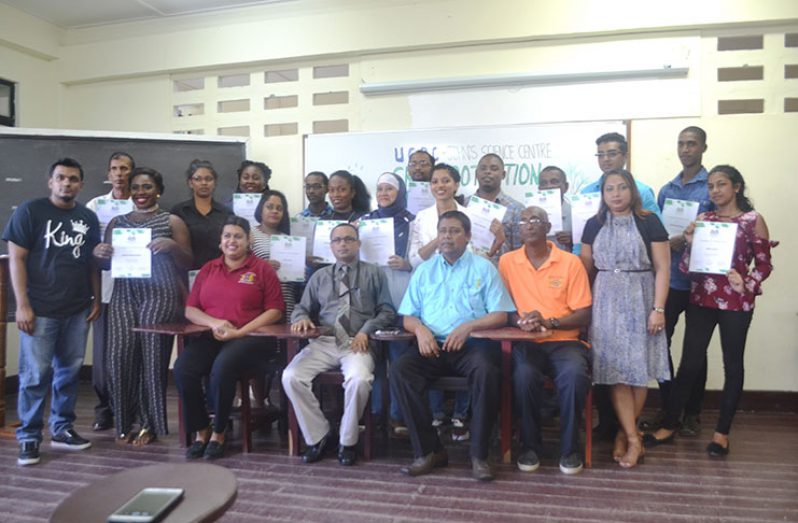… participants grateful for hands-on training
THE University of Guyana Berbice Campus (UGBC), Faculty of Natural Sciences on Friday, January 19, concluded a five- day workshop on Crop Protection which assisted participants in identifying diseases in rice and crops.
Among the participants in the workshop were 73-year-old Seenarine Ramlakhan and 61- year-old Mohin Namsaram, who are both rice farmers.
Ramlakhan, who hails from Lesbeholden, Black Bush Polder, told the Guyana Chronicle that he has been a rice farmer for over 50 years. He stated that the knowledge gained from the workshop will be shared with other farmers so they can improve the way they cultivate rice.
“There is a problem among farmers in identifying and diagnosing disease. It is never too late to learn and I always want to know how I can improve the way to ensure I do things a lot better,” he said.
Mohin Namsaram 61, said this is the first time he had participated in a workshop in all of his career. He said that he was amazed by the hands-on experiences provided. “It was very informative. I never before used a microscope and was able to do that. The practical in the lab and being able to see disease and fungus under the microscope was educational.”
Vice-Chancellor of the UGBC, Phillip Da Silva, while delivering brief remarks, said the workshop is one that supports the whole aspect of food security and UG has been one which supports national goals and national objectives.
“Food Security is very important and requires not only people out there producing agriculture crops but also those who are selling, consuming and teaching. UGBC has over the years tried to not isolate, but try to share that knowledge and expertise that reside within the
institution. This workshop is more or less testimony to see the East Berbice as a community and we see ourselves as an integral part of the community,” Da Silva said.
He continued by urging the participants to put what they learned into good practice. “Take what you learned to enhance Guyana’s food security, so when we stand up and speak about Guyana being the breadbasket of the Caribbean, we can even go further and extend it and say it is not just talk but with your help, make sure it becomes reality,” he said.
Meanwhile, Director of UGBC Dr. Gomathinayagam Subramanian who is no stranger to the farming community in Region Six said since he joined the campus in 2006, he has been volunteering his services to cash crop farmers on a weekly basis then, after taking up the position of Director in 2013, on a monthly basis. Using his experience as a Plant Pathologist
and Soil Microbiologist Dr. Subramanian said based on his observation the Guyana soil is more conducive to disease, which is why farmers are always plagued with diseases.
“In the past, we have relied almost solely on agricultural chemicals to provide plant nutrients and to control pests within our agro-ecosystems. However, we have found that over time more and more chemicals are needed to obtain the same results or to prevent pest problems,” he said.
An alternative to the chemical treadmill is to use the natural strengths of the crop and surrounding vegetation to increase plant health. The training in crop protection is a first step to increase knowledge and skills with regard to sustainable crop-protection management.
Moreover, the director said since 80 percent of the workshop was practical, participants got a hands-on approach which helped to increase their laboratory skills and knowledge of diagnosis of plant disease, plant pathogens, isolation techniques and making a pure culture of fungi. These activities were done in the labs as well as on a field visit to Black Bush Polder.
Chief Executive Officer of Nand Persaud and Company Limited Mohindra Persaud, delivering the guest speaker’s address, urged the participants to share their knowledge with the other farmers since he knows for a fact that there is a demand for high-quality agricultural produce.
Persaud stated that it is good to see the university and the National Agricultural Research & Extension Institute (NAREI) taking the initiative to lead the way in educating farmers and pressed for agriculture to be on the front burner and not be considered something of the past.
“In Guyana, the consumers do not want certain products, they want standard stuff, they want high-end products and there is scope outside of Guyana for these products but as farmers, you have to think outside of the box and produce what the people want. Move away from inferior quality and follow the criteria size, price, presentation and move away from traditional crops; be bold, do non-traditional organic produce, this is what the people want.”
He continued by stating that Berbice, and by extension most of Guyana, is at an advantage since there are a lot of flatlands unlike most of the Caribbean where farming is being done on the hills and called on the government to open more lands for farming, so that Guyana can be the go-to nation for agricultural produce.



.jpg)








